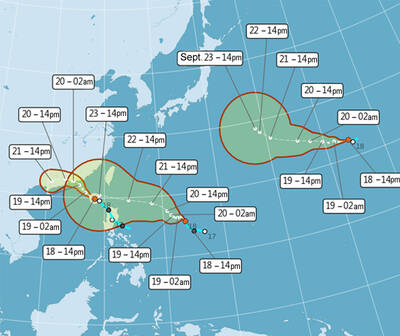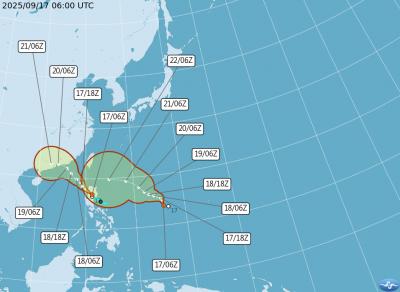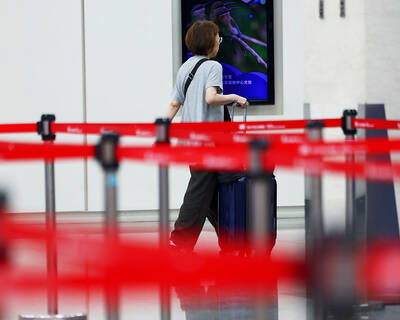Shanghai opened the doors on the World Expo this month with a lavish opening ceremony and futuristic pavilions from 189 participating countries, but the event also brought serious traffic congestion and chaos to the city as visitors flocked to the expo site.
The opening ceremony on Friday night last week attracted tens of thousands of visitors to the expo site along the Huangpu River. After the ceremony, traffic around the area was paralyzed as people filled the streets waiting for buses or trying to hail taxis.
The city closed several subway entrances to prevent the subway exceeding capacity, adding to the difficulty of getting home.
Among the crowds wandering the streets of downtown Shanghai at midnight were foreign reporters who were transported to People's Square following the opening ceremony. Some reporters walked for more than 30 minutes to find a free taxi, while many Taiwanese reporters went back to their hotels on foot.
Mavis Lin, a Taiwanese reporter who walked for about an hour from People's Square to her hotel in the Puxi area, said the street scene was so chaotic, with people fighting to get on buses or taxis, that she gave up on finding public transportation.
"Imagine the street scenes in Taipei after the New Year party and double the number of people on the streets. That's how chaotic it was," she said.
An unlicensed taxi driver, who charged more than 300 yuan (US$44) for a 15-minute ride that normally costs only 20 yuan, said the expo organizers overlooked traffic flows and that the public transport system was unable to cope with the demand even before the expo began and hundreds of thousands of visitors crowded the city.
"It's already difficult to get a cab in Shanghai, and the expo has made things worse. You won't be able to find a licensed taxi now," said the driver, who refused to give his name.
With more than 25 million tickets already sold, more than 70 million people are expected to attend the 184-day event, an average of nearly 400,000 per day, according to the expo organizers.
About 4,000 new cabs have been put into service to accommodate the record-high number of visitors. Only these taxis are permitted to take passengers from four designated taxi stops at the Pudong and Puxi expo sections, while other taxis are barred from the area between 7am and 9pm, according to organizers.
One designated taxi driver surnamed Wang said the city installed GPS devices on all of the 4,000 taxis to monitor the situation, as taxi drivers are banned from picking up passengers in other areas.
Shanghai Mayor Han Zheng (韓正) said during his visit to Taipei last month that the city has constructed four new subway lines, including the newly launched Line 10, and that they should ease congestion during the expo. Shanghai also encouraged people to use public transportation by setting up nine P+R (park and ride) spots near subway stations that offer parking spaces for visitors.
The city's measures to ease the congestion in Shanghai, however, have failed. Long lines of cars clogged the highways leading to downtown Shanghai and the expo site. Traffic congestion was also serious around the city's major attractions such as the Bund, which was crowded with local tourists who rushed to Shanghai when the Golden Week holiday began on May 1.
Commissioner of Taipei City's Department of Transportation Luo Shiaw-shyan (羅孝賢), who accompanied Taipei Mayor Hau Lung-bin (郝龍斌) to attend the opening of the Taipei pavilion at the expo on May 1, said the shortage of taxis had been an issue in Shanghai and the large number of visitors at the expo highlighted the problem.
The city only issued taxi permits to people with registered households in Shanghai. With a population of over 19 million, Shanghai has only 40,000 taxis, while in Taipei there are 60,000 taxis, Luo said.
Tight security checks at all subway entrances also discouraged people from taking public transportation. Security checks at subway stations were required after the city opened subway Line No. 13 that passes under the expo site. All passengers are required to pass through electronic detection devices and have their bags checked when entering stations.
Traffic inside the expo site was better. Expo organizers set up bus stops every 250m within the 5.28km2 site and services are frequent. A total of 120 buses roll by every three minutes to take visitors between the Pudong and Puxi Expo sites.
Lily Zhou (周莉莉), a Shanghai resident who visited the expo on May 4, said the shuttle buses were convenient, but complained about the long lines in front of the bus stops and delays.
"There are just too many visitors to the expo and the site is so big. It took us over 30 minutes to walk from Zone A to Zone C in the Puxi section in the evening because the shuttle bus didn't come," she said, urging the expo organizers to provide more frequent shuttle bus services.
The expo organizers said they expected smoother traffic and smaller crowds this week as the "Golden Week" holidays in China ended on Tuesday.

PEAK MONTHS: Data showed that on average 25 to 27 typhoons formed in the Pacific and South China seas annually, with about four forming per month in July and October One of three tropical depressions in the Pacific strengthened into a typhoon yesterday afternoon, while two others are expected to become typhoons by today, Central Weather Administration (CWA) forecaster Lee Ming-hsiang (李名翔) said yesterday. The outer circulation of Tropical Depression No. 20, now Typhoon Mitag, has brought light rain to Hualien, Taitung and areas in the south, Lee said, adding that as of 2pm yesterday, Mitag was moving west-northwest at 16kph, but is not expected to directly affect Taiwan. It was possible that Tropical Depression No. 21 would become a typhoon as soon as last night, he said. It was moving in a

A Taiwanese academic yesterday said that Chinese Ambassador to Denmark Wang Xuefeng (王雪峰) disrespected Denmark and Japan when he earlier this year allegedly asked Japan’s embassy to make Taiwan’s representatives leave an event in Copenhagen. The Danish-language Berlingske on Sunday reported the incident in an article with the headline “The emperor’s birthday ended in drama in Copenhagen: More conflict may be on the way between Denmark and China.” It said that on Feb. 26, the Japanese embassy in Denmark held an event for Japanese Emperor Naruhito’s birthday, with about 200 guests in attendance, including representatives from Taiwan. After addressing the Japanese hosts, Wang

One of two tropical depressions that formed offshore this morning could turn into a moderate typhoon by the weekend, the Central Weather Administration (CWA) said today. Tropical Depression No. 21 formed at 8am about 1,850km off the southeast coast, CWA forecaster Lee Meng-hsuan (李孟軒) said. It is expected to move in a northwesterly direction as it continues building momentum, possibly intensifying into Typhoon Mitag this weekend, she added. The radius of the storm is expected to reach almost 200km, she said. It is expected to approach southeast of Taiwan on Monday and pass through the Bashi Channel between Tuesday and Wednesday,

About nine Taiwanese are “disappeared,” detained, or otherwise deprived of freedom of movement in China each month, the Mainland Affairs Council (MAC) said yesterday. Between Jan. 1 last year and Aug. 31 this year, 188 Taiwanese travelers went missing, were detained and interrogated, or had their personal freedom restricted, with some questioned in airports or hotel lobbies, the council said. In a statement ahead of the Mid-Autumn Festival, the council urged people visiting China for any reason to be highly vigilant and aware of the risks. Of the reported cases, 50 people were “disappeared” after entering China, 19 were detained and 119 had